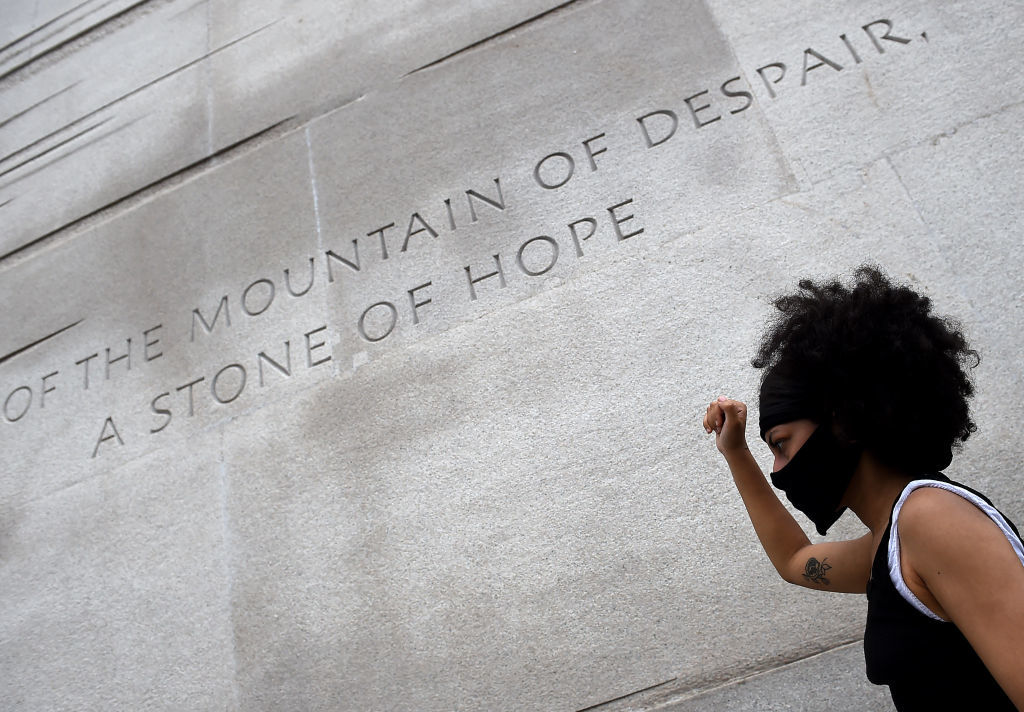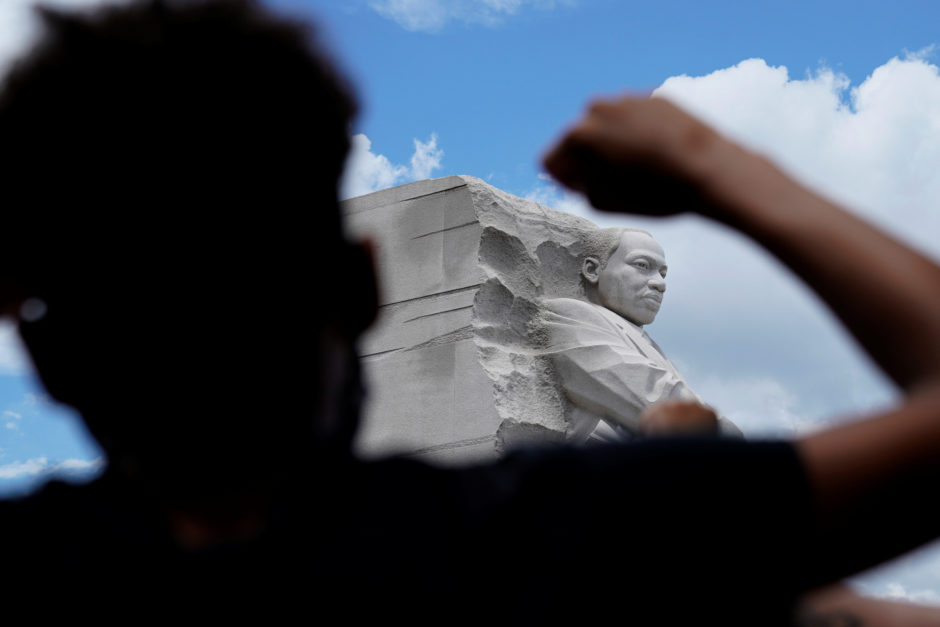June 27, 2020
Forward, then backward. It's a recurring pattern in the history of African-Americans' fight for equality — moments of progress, followed by heartbreak.
That historical struggle is chronicled in the sweeping tome Before the Mayflower: A History of Black America.
The book recounts the celebration now known as Juneteenth: in 1865, as word spread across southern plantations that slavery had ended, a chain of "emotional bombs" exploded, one after another, with one witness comparing the experience to walking on golden clouds.
Over the next decade, more than a dozen African-Americans were elected to the U.S. Congress. Black Americans used their new freedoms to help rewrite state constitutions and integrate public school systems.
Then came the Ku Klux Klan.
Their plan, Lerone Bennett Jr. writes in the book, was to "reduce blacks to political impotence. By the boldest and most ruthless political operation in American history. By stealth and murder, by economic intimidation and political assassinations."
Murderous mobs kept Black people from voting — some of the mob leaders became famous politicians and built the Jim Crow system of segregation. Some still have public monuments dedicated to them.
The cycle of advancement and retrenchment repeated in the Civil Rights era. In a subsequent backlash, some key achievements, such as school integration and equal voting access, were eroded by public policies and court decisions.
A new generation of protest is here.
Already this year, a deadly pandemic laid bare long-term inequalities in health care, employment and education, as Black communities suffered the harshest consequences of COVID-19.
Then came the killing of George Floyd. The death of the unarmed Black man in police custody lit a fuse that sparked protests across the country, prompting reforms and further calls for change.
We spoke with demonstrators at a Black Lives Matter march on Juneteenth in Washington, D.C., about how they see this moment.
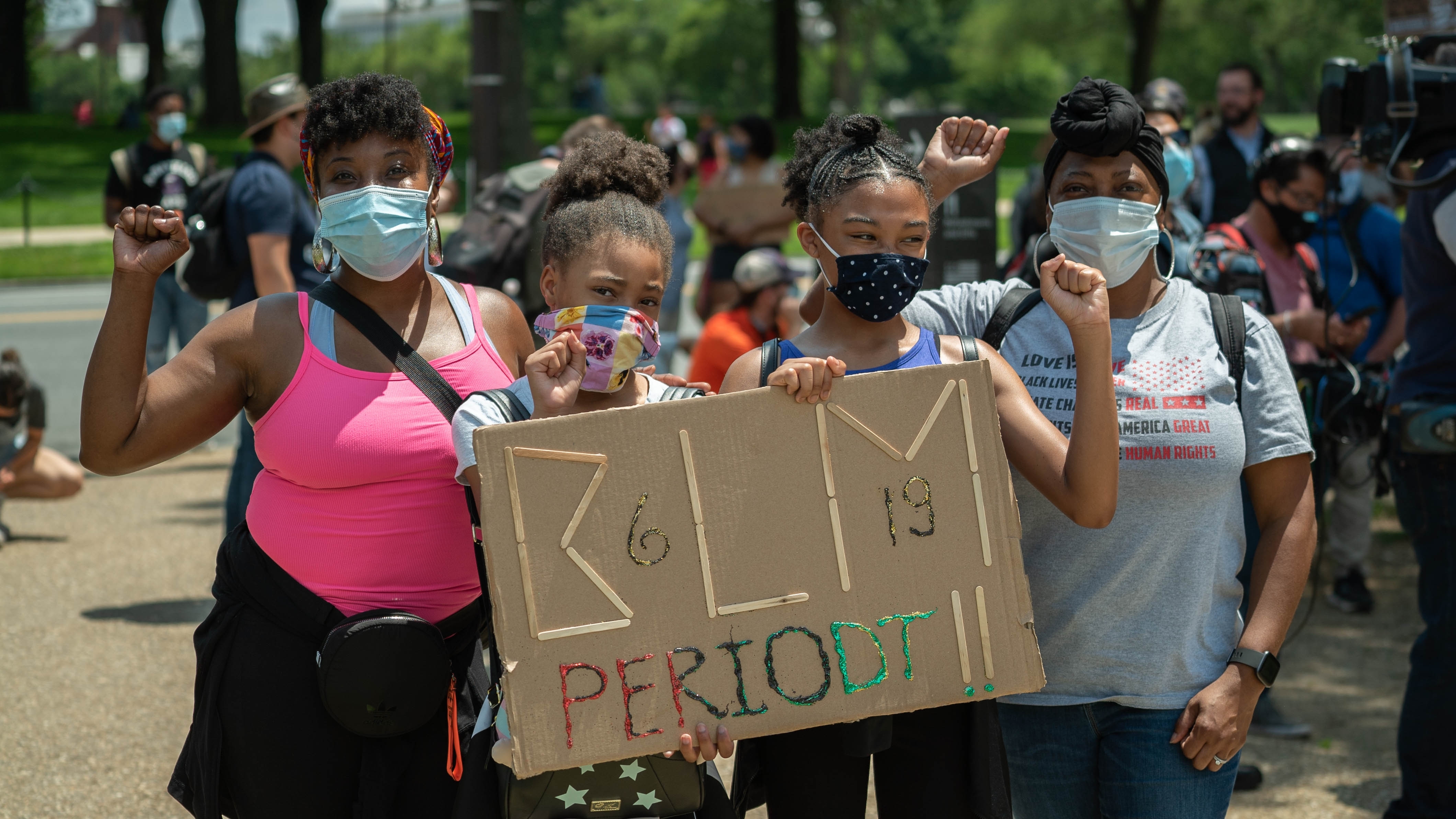
Pamela Springer, 37
What changes she wants: "I would like to stop turning on my TV, my radio, and seeing another Black — Black woman, Black child, brown person — gunned down like dogs, like animals in the street," said Springer, a psychology student at University of Maryland. She says policing needs to be drastically reformed to focus on community involvement and quicker discipline for abusive officers.
Her message to any officer who wants to quit in protest of these change: "Too bad. Get out. Bye. If you feel this is not for you because you can't put a chokehold on someone … good riddance." But, she says, racial disparities go far beyond policing. "Health care, education. It seems like we've gotten the worst of everything. … You can't watch this and be OK."
She says she also wants to see more racial minorities in the U.S. Congress, who will promote change.
What racism she's experienced: Growing up, she noticed that her school in Manhattan, in a whiter area, had great teachers, better computers and more extracurricular activities than schools in Black areas. In an early professional job at an accounting firm, the company head, a white accountant, asked if she could touch her braids: "I'm thinking to myself, 'That doesn't make me comfortable.' … I said no. I didn't get a great vibe from her after that. She cursed at one point. The energy between us was not the same.… It made me feel uncomfortable, but who could I tell? … A month after that, I was fired."
Last year, working at a bank, a project manager kept making comments to her and a Black colleague that made them feel picked on. "I felt like he just wanted to provoke us. He would ask things like, 'Why do Black people hate the Confederate flag? … He'd put on Motown music and ask if we're comfortable listening to that." She said she felt powerless to complain to him, or to the company. "He was one of the higher-ups in management. What could we say to him — 'No, I don't like this?'"
Is she optimistic or not: "I'm a little bit of both. I'm more optimistic because I'm noticing companies, mayors, governors, Congress ... noticing the protests and listening to us when we say, 'Enough is enough.'"
Now she wants to see more Black people in positions of power. "Black lives matter? I want to see that on your board of directors. In your offices.… You can't shout these slogans and tell me Black lives matter, but you're not trying to make any changes in your organization that reflect that our lives matter.… We're not letting up. We're not going to stop asking."
Takima Davis, 44
What changes she wants: Davis, a federal investigator, wants to see laws that increase health-care access and reduce prison sentences. She says the country's education system also needs an overhaul. She says Americans mythologize self-reliance but need to know that slave owners got cash reparations after slavery ended while slaves did not. Meanwhile, generations of racist policies in banking and urban planning stripped Black people of opportunities to accumulate wealth.
"The first thing that needs to change is we need an accurate depiction of this country.… We're not taught the history of Black people or African-Americans. What that does is give one group of people a sense of superiority — white people. And Black people a sense of inferiority — which leads to so many other things. That system that we live in has been a system of oppression and white supremacy. The education system in this country is taught through that lens. That whites are great; Black people are not. Black people were slaves; white people were not.… We should start there. With education."
What racism she's experienced: "The only time I was ever called a n--ger in my life was on Long Island, New York. The reason I was called a n--ger by a girl I went to school with was because I was running for class president. She didn't want me to win, and she made sure she let everyone know that, 'The n--ger shouldn't win and be president over any white kid.'"
Two years ago, as Davis was leaving a Target store, a man followed her and asked whether she knew she had something at the bottom of her cart. "I had the receipt in my hand. I said, 'Are you asking me if I was stealing?'"
"We get tired of being falsely accused. We get tired of being followed around stores. It's not only disrespectful. After a while, you just get tired."
Davis said a police officer pulled her over in Virginia "[He asked] me not only if I had drugs in my car but if my children were my children and where I was going. I was so offended. It's the little subtle things like that. Where you're accusing me of doing something illegal, when all I'm doing is driving home.… It's very sad. And it's sad when you explain it to people, and people act like that doesn't happen or you're making it up."
Is she optimistic or not: "I'm very hopeful. I'm hopeful in the advocacy that I see throughout the United States." Davis says people of all races are showing more empathy and a willingness to change. "They're stepping in and saying, 'That's not right.' … Watching the police officer sitting on someone's neck for 8 minutes, 46 seconds — to watch the life leave a person — has awakened people in this country. Some people were just asleep, and they didn't believe it. You know, white privilege is a real thing."
She says people across the U.S. are realizing policing needs to change. "The best in everyone is coming out. They're finally seeing what we've been talking about for hundreds of years."
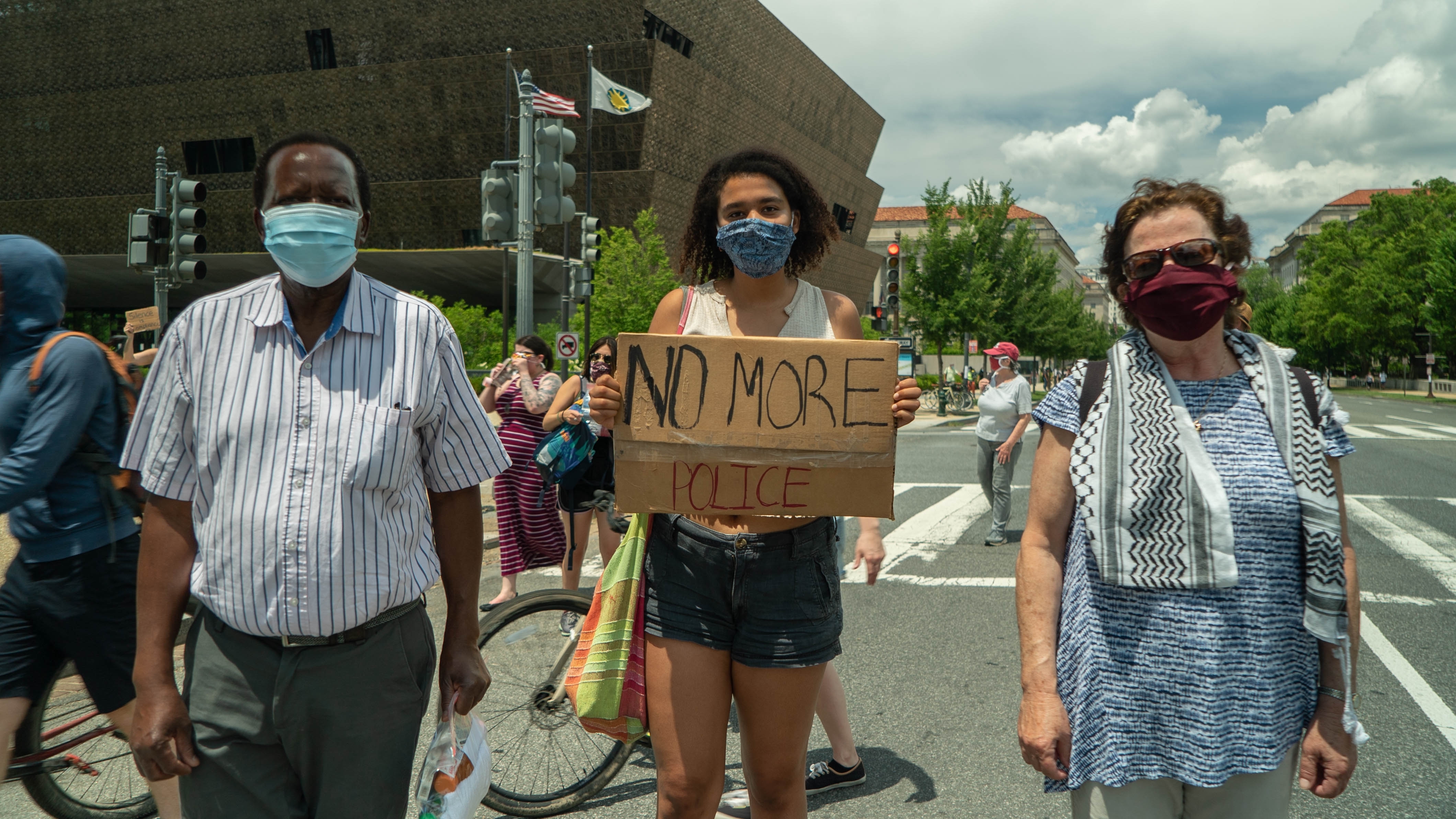
Handel Mlilo, 72
What changes he wants: Mlilo, a retired communications professional, says people need to start by enforcing anti-discrimination laws and standards that already exist. "Partly, it's because we have at the leadership level in this country what I consider an enabler. Somebody who feeds off the hate and the racism and the ignorance that exists in society. The first thing that has to change is the leadership at the top. … What you have right now is somebody who says, 'I will take advantage of what's going on in society.' … As far as I'm concerned, November can't come soon enough.… The current administration has to go."
Mlilo says police forces can't be used to handle social problems and believes resources should be redeployed from policing to services that can better handle those problems.
What racism he's witnessed: A Zimbabwe native who also lived for years in Canada, then Boston, now in the Washington area, Mlilo says he thinks he has lost job opportunities because of racism. He's also experienced housing discrimination. "I have had the N-word scrawled onto my car — in liberal Massachusetts, in Boston. I parked my car, I went into a friend's house, [and] when I came out, it was scrawled there."
Is he optimistic or not: “I'm optimistic. … I'm a Baby Boomer. … I see more activism now. Where we said, 'This is wrong. This needs to change,' this younger generation is saying, 'We're not gonna take this anymore.' I like what I see."
Nadine Sahyoun
What changes she wants: "People have been exposed to inequity across the board," said Sahyoun, professor of nutrition and food science at University of Maryland. "In all aspects of things — whether it's health, education, housing. I would like to see some changes in opportunity — much more opportunity for this population.… Even in COVID-19, we are seeing there are twice as many deaths as for other population groups. That is an indication that there are really big problems.… Health coverage is part of it, as is access to health care.… And of course, we have been talking about police brutality — this is another area. We would like to see defunding of the police."
What racism she's experienced: Sahyoun is of Palestinian origin, and her husband, Handel, is from Zimbabwe. She says they occasionally come across subtle discrimination, but they experienced one especially blatant case many years ago in Boston: "Way back when we were dating, we were exposed to housing discrimination.... We went to see an apartment that was empty, that was available. After we left, they told us it was no longer available. Then the real-estate person contacted us and apologized and said, 'They don't want to rent to [you].'"
Is she optimistic or not: "Actually, I am optimistic. It's a slow process, but it's definitely moving forward. The demonstrations made me feel really good. I saw people from a lot of different backgrounds, from different racial groups.… There are some changes going on. These have taken place with very slow progress. I just hope it's going to be a little bit faster now."
WATCH | Protesters gather on the National Mall in Washington, D.C., to voice their opposition to police violence and systemic racism:
Miranda Mlilo, 22
What changes she wants: "I personally want to see police departments across the country defunded and those resources allocated to services that are better equipped to handle these issues like ... homelessness or mental health or domestic violence," said Mlilo, who works as an intern at the environmental organization Friends of the Earth.
"I consider myself a police and prison abolitionist because I believe that the resources that are spent on police and the militarization of police departments is causing more harm in communities than benefits. The money that is spent on police departments should be reinvested in social services and housing in those communities, education, access to health care."
Mlilo said she wants that change to happen gradually but that she considers existing police forces to be unreformable, because they have proven to be antagonistic to minority groups throughout history. She also wants to fight disparities in health care and education and abolish current prison-labour practices.
What racism she's experienced: "I see police officers harassing Black people all the time. On multiple occasions, I have seen kids that look like they're no older than 12 in handcuffs being detained without a parent or guardian present.… I see aggressive behaviour from the D.C. police to Black populations all the time. I've seen police harass homeless people. I've seen police harass people that have mental health issues or other issues. And every time I've seen it, it's been Black people. I've yet to see police treat white people in D.C. in that same way."
She said she has never personally had an altercation with police but that some of her Black family members have been insulted and harassed by officers.
Is she optimistic or not: "I think the protests are going really well in terms of organizers being very clear with their demands — and one of those demands is defunding the police and police abolition.… There's a shift in public consciousness from the recognition of police brutality — which is the bare minimum — to the act of defunding the police, which is much more mainstream than it was years ago. In terms of that, I'm optimistic, but in terms of addressing systemic racism, we have a long way to go."
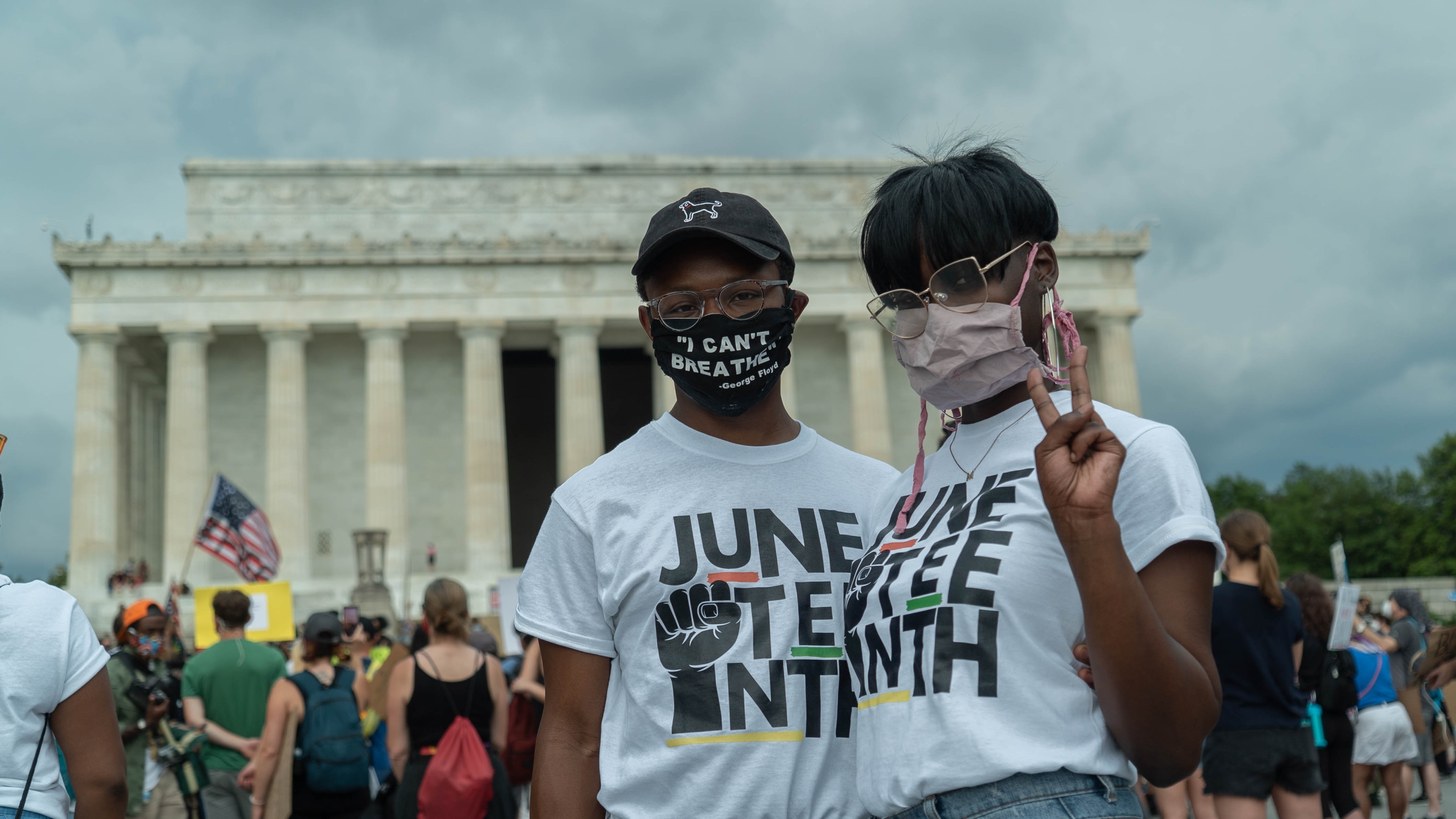
William Bristol, 24
What changes he wants: "In 24 years of my life, I have never seen so much harm by police," said Bristol, a financial analyst. "I've grown up with police all my life. My father is actually a police officer. Growing up, I never saw police as a threat. I just thought they're fair, they're here to protect us. … But over the last [several] years, I've seen so much police brutality, especially against African-Americans, and nobody seems to care.…
"I'm marching because that's wrong, and police reform needs to happen immediately. I think it's a systemic issue. I don't think all police are bad. I just think the system is bad.… We need to be treated fairly. We shouldn't have to be scared to pull up at a stop light."
Bristol says he wants to see police forces restructured. He said he's discussed these issues with his father, who agrees there's a need for reform.
What racism he's experienced: He said he's grown up in a diverse community and hasn't experienced the worst forms of discrimination. But some of his friends, especially those with more common African-American names, have been treated worse. "They're just approached differently." He said those friends might get passed up for a job or face poorer treatment at work.
He described one such experience at a recent job, where he and a friend shared identical criticisms with their supervisor about the company. "I said the exact same thing to our manager, and it was taken 99 per cent better than my friend Andre. And he was laid off in a few weeks."
Is he optimistic or not: "This is going to be a stepping stone. I don't think we're going to see immediate change. I really don't. I think it will be a generational change, a generational mindset change, a change in government leadership.… I think we're a very divided country.… I think it will be like the other protests we've had for years. We'll talk about it, we'll continue talking about it, then, in a few months, when everything is OK again, it'll just go back to normal. Then something will happen again in another couple of years, and we'll just start all over again."
Adeana Gibson, 23
What changes she wants: "My main issue is that the police we are faced with are more scared than they are actually thinking about securing people," said Gibson, a health services worker in Baltimore. "The police we have right now need more training.… They're irrational in the decisions they make, in terms of force and when to use it … I feel they're more intimidated by the people they encounter. They use that as a tactic. By them being, like, 'Well, you're intimidating me,' that gives them, in their mind, a reason to use force. Because now, they feel threatened."
Gibson said fewer guns in the U.S. would make police less scared. "Cops are more easily provoked here because they're always assuming everyone has a weapon.… [There] should be more strict policies on bearing guns and who has the right to own and use a gun."
She said she came out to the Juneteenth protest in D.C. to voice her concerns over other social issues, too: "Health insurance. Dental care.… Things other countries' citizens are entitled to.… I don't think it's just Black and white. It has more to do with poverty and not poverty."
What racism she's experienced: Gibson grew up in a suburb of Baltimore and says she didn't experience much racism herself. But she said she saw Black children treated with more hostility than white children. "This person's watching you, or you can't go on that person's lawn without them throwing a fit." She now works in the city and recently noticed police being called on two kids selling water in the street. "But there was a stand with two white girls selling lemonade.… The same person who called the police on the two Black kids went and bought something from the two white girls. Yeah."
Is she optimistic or not? "I am. The protests are bringing awareness and light to situations that had been pushed into the dark. When you're constantly confronted with the truth, you can't run from it. You have to face what everybody is talking about. And eventually, you're going to get tired of people yelling and protesting and screaming. And you're just going to have to do what you were supposed to do from the beginning."
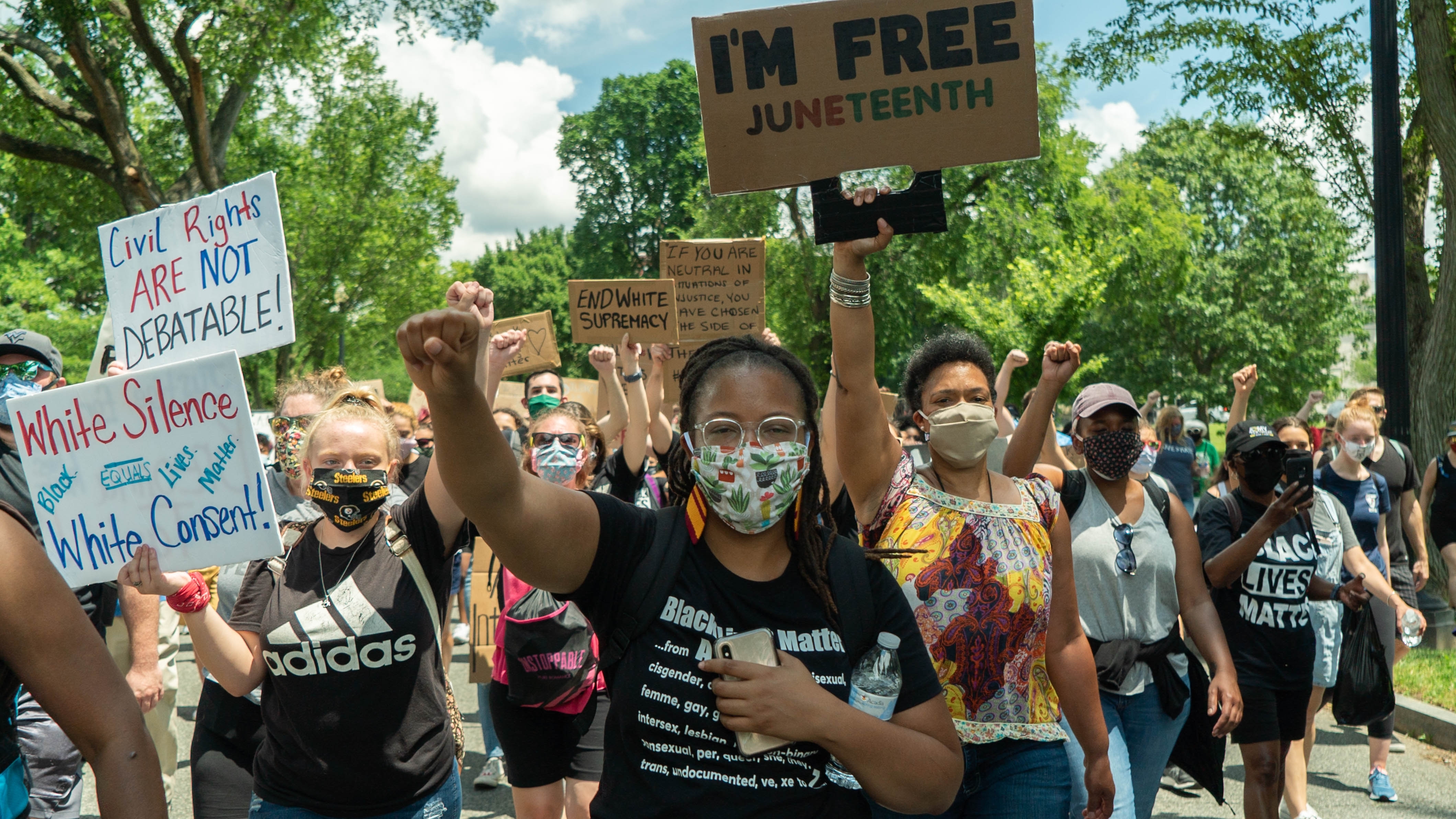
Akilah English, 34
What changes she wants: English, who works as a deaf and hard-of-hearing specialist in D.C. public schools, said there needs to be a conversation about how police work with people with special needs. She said more police forces, for example, need units that can communicate with deaf people. "I am deaf. My goals are a bit different.… I'm not only fighting against systemic racism but also for people with disabilities who are Black … I just, at this point, feel lost.… I would like to see more empathy, compassion for Black people, especially for people with disabilities
"Right now, we're scared when the cop comes up or more scared because we have a communication factor, plus we're Black." She said people have been killed because of misunderstandings with police, and police need to be more sensitive.
What racism she's experienced: "When I was 13, I went to the mall with my friends, who happened to be white. The mall was closing. Police showed up. People were milling about.… The next thing I knew, the police were pointing at me. They were talking directly at me.… 'Come here.' … Luckily, I can lip read a little bit. [An officer] said, "I told you to leave. Why are you not listening?' … I went ahead and told him that I was deaf, but he was stubborn and didn't pay attention. I pointed to my ear, signifying that I can't hear. And then my friend was also there saying, 'No, she's deaf, she's deaf.'
"He just seemed to ignore it. He said, 'If I catch you again, if you're not listening, I'm going to put you in jail.' … I was with a group of friends who were white, and he was talking only to me, threatening me. Saying he was going to take me to jail.… That's not the only time. And it's not just police. It's everyday people as well. That's just what we face, unfortunately."
Is she optimistic or not: "The history of racism, it's 400 years here. We're talking about deep, deep systemic issues. … We've got a long way to go still. I am hopeful, but we are talking about generations and generations of trauma. Trauma is in our DNA at this point. We need a few more generations to heal.… I am optimistic, but I'm not going to see any huge changes in my lifetime. It's going to take a long time for the country to heal.… I am happy to see this happening. It's definitely a much-needed discussion. Everyone's talking about it now, but I am just afraid it will start to fizzle out. I hope it doesn’t this time."
